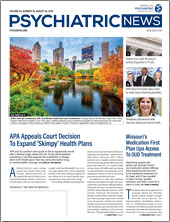Although the electronic health record (EHR) is an essential component of modern health care, it is also a major contributor to physician burnout and career dissatisfaction. Now, new research has honed in on what exact aspect of the EHR is causing the angst: Those numerous, automated, algorithm-driven messages that pop up as soon as the doctor logs in.
The study, from a California multispecialty health care delivery organization that has used an EHR for two decades, was published in the July issue of Health Affairs.
Among 934 physicians who responded to a survey, 36% reported burnout symptoms and 29% expressed an intention to reduce their clinical work time in the coming year. Nearly half of their EHR in-basket messages were those that are automatically generated by system algorithms, while far fewer were person-to-person messages from patients or other clinicians.
Receiving an above-average number of system-generated messages—defined as more than 114 per week—was associated with a 40% higher probability of physicians experiencing burnout symptoms and a 38% higher probability of intending to reduce their clinical work hours.
“These are new findings that deserve careful consideration,” wrote lead author Ming Tai-Seale, Ph.D., a professor in family medicine and public health at the University of California, San Diego, and colleagues. They added, “Collective actions are needed at the national and local organizational levels to bring about systematic changes to this previously little-known yet important source of friction.”
According to psychiatrist Richard Summers, M.D., an expert in physician burnout, “the electronic health record is central to the whole evolution of physician burnout. If you speak to a roomful of physicians and ask what their chief cause of burnout is, to the extent they have it in their personal experience, far and away the immediate response is the electronic health record. It’s certainly true in psychiatry and across specialties.”
The information provided in the Health Affairs study is “incredibly important,” added Summers, who is a clinical professor of psychiatry at the University of Pennsylvania. “People talk about the effect of the EHR in general and the amount of time physicians spend [with it] and how it intrudes into the doctor-patient interaction and encounter. But this article drills down to a different level. It looks at very specific aspects of the EHR and how it affects burnout. It’s these autonomously generated emails that are more correlated with burnout than the total amount of time people spend with the EHR. … It’s a pretty fascinating signal that they found.”
Summers hypothesized that although the automated messages are important for quality of care, they may cause distress because they are dehumanized and less related to a physician’s self-identity. Attending to them may feel more like clerical work than responding to messages from a person or entering clinical notes.
“Automated reminders to order tests or do other things are super important. But think how that feels compared to getting a message from the oncologist for your primary care patient saying that she is worried about your patient’s nausea. That’s what makes me feel like a doctor,” he told Psychiatric News.
Summers “absolutely” agreed with several of the suggestions made by the study authors that health care organizations can take to minimize this particular EHR burden, including redirecting certain automated messages like prescription refill requests or routine orders for bloodwork, to allied health professionals and limiting a physician’s desktop medicine work during non-work hours when the physician is not on call.
He added that just being aware of these study results can help. “I think this finding itself could help decrease some burnout because it actually helps you understand what bothers you and what doesn’t. Rather than just getting upset about it, realize that this is part of where we are.”
Summers is co-author of Combating Physician Burnout: A Guide for Psychiatrists, due to be released from American Psychiatric Association Publishing in October. The study was funded by the Palo Alto Medical Foundation Philanthropy Department. ■
“Physicians’ Well-Being Linked to In-Basket Messages Generated by Algorithms in Electronic Health Records” is posted
here. The podcast series
“Psychiatry Unbound” from APA Publishing features a
podcast in which Peter Yellowlees, M.B.B.S., M.D., and Jay H. Shore, M.D., M.P.H., examine the multiple risk factors that account for the higher rates of burnout, depressive symptoms, and suicide risk physicians experience compared with the general population. On the second half of the podcast, Dr. Roberts discusses physician wellness with Dr. Grace Gengoux.

